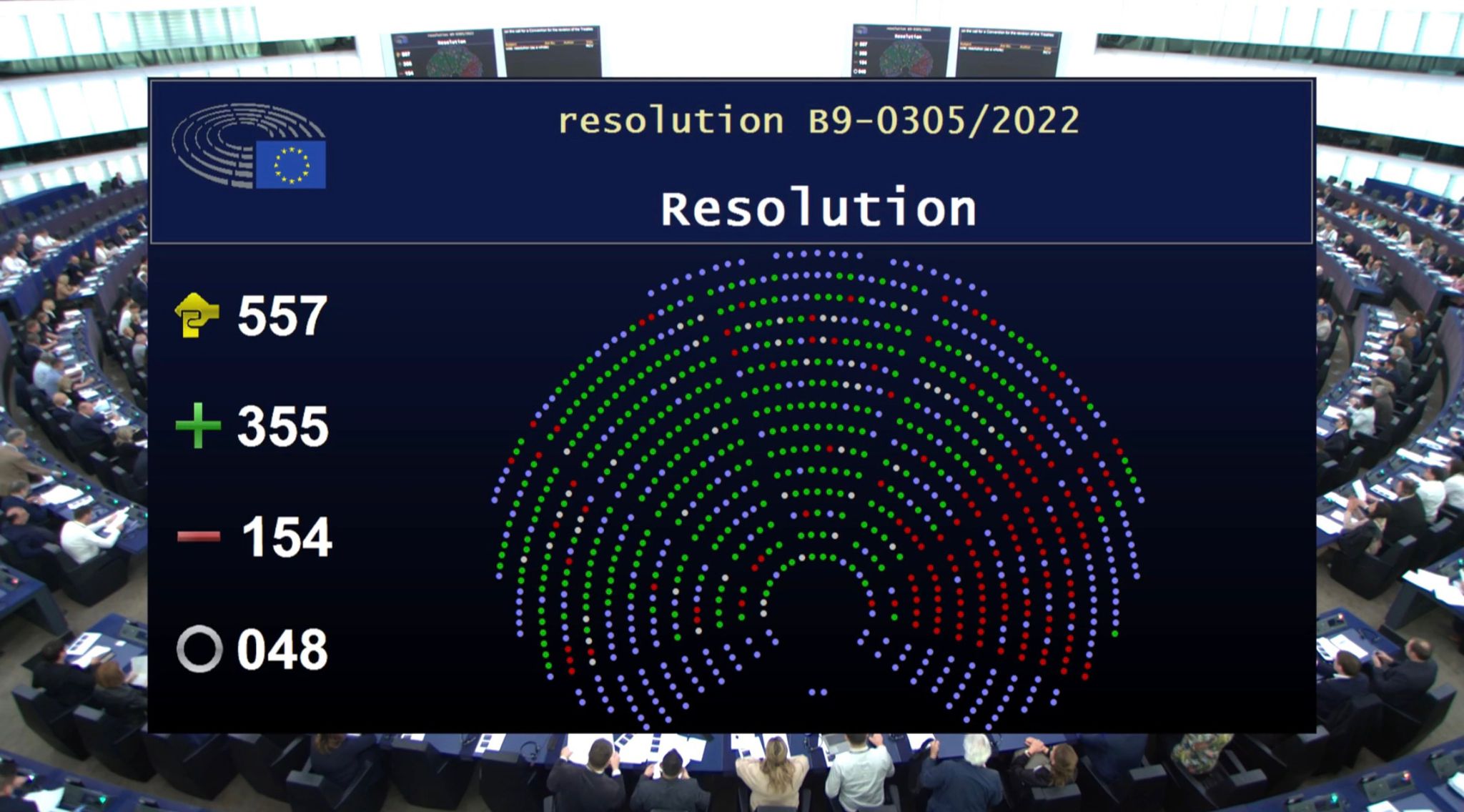European Parliament launches process for amendments to EU Treaties
Dear Europeans,
Historic vote in the European Parliament! A clear majority (355 yes, 154 no, 48 abstentions) voted today (Thursday) in favour of amendments to the EU Treaties, thus launching a so-called Article 48 procedure for the first time. With this vote, the Parliament initiates the process for convening a (Constitutional) Convention. The final decision rests with the EU heads of government by simple majority. President Macron had indicated that a parliamentary proposal would be put to the vote as early as 24 June. Specifically, the European Parliament proposes the abolition of national vetoes on EU sanctions and the so-called passerelle clause. This allows the Council of Member States to replace unanimous votes with majority decisions, for example on taxes. Without proposing any concrete text yet, the European Parliament also calls for EU competences in health, energy, a social progress protocol, full budgetary and legislative initiative rights for the European Parliament and better safeguarding of EU fundamental values.
The process follows the Conference on the Future of Europe (CoFoE), where reform proposals for a more democratic EU were developed together with European randomly selected, representative citizens.
Daniel Freund, Greens/EFA rapporteur for the Article 48 procedure, comments:
“For the first time ever, the European Parliament is initiating a comprehensive amendment of the EU Treaties. This is a historic step. The clear result shows: The governments of the EU member states must not duck out of the way now. This overdue reform process must not be blocked or delayed. We expect from Macron a vote in a fortnight and the green light for a convention to discuss and decide on the citizens’ proposals.
Our most important reform demand is the end of the vetoes. For too long, the EU has allowed itself to be blackmailed by Viktor Orban and the PiS government, on sanctions, on minimum taxes for companies, on the rule of law. In the Future Conference, citizens demanded an end to national vetoes. We are now taking the next step, clearly following the mandate of European citizens. The EU must become more efficient and more democratic!”
———-
draft (and final text) of today’s Parliament resolution: https://www.europarl.europa.eu/doceo/document/B-9-2022-0307_EN.html
from the resolution: the legal amendments to the treaties
Article 29 TEU – on sanctions
The Council shall adopt decisions which shall define the approach of the Union to a particular matter of a geographical or thematic nature. Where a decision, provides for the interruption or reduction, in part or completely, of economic and financial relations with one or more third countries, the Council shall act by qualified majority. Member States shall ensure that their national policies conform to the Union positions;
Article 48(7) TEU – on the Passerelle clause
Where the Treaty on the Functioning of the European Union or Title V of this Treaty provides for the Council to act by unanimity in a given area or case, the European Council may adopt a decision authorising the Council to act by a qualified majority in that area or in that case. This subparagraph shall not apply to decisions with military implications or those in the area of defence.
Where the Treaty on the Functioning of the European Union provides for legislative acts to be adopted by the Council in accordance with a special legislative procedure, the European Council may adopt a decision allowing for the adoption of such acts in accordance with the ordinary legislative procedure.
Any initiative taken by the European Council on the basis of the first or the second subparagraph shall be notified to the national Parliaments. If a national Parliament makes known its opposition within six months of the date of such notification, the decision referred to in the first or the second subparagraph shall not be adopted. In the absence of opposition, the European Council may adopt the decision.
For the adoption of these decisions, the European Council shall act by qualified majority vote according to the procedure laid down in Article 238(3)(b) after obtaining the consent of the European Parliament, which shall be given by a majority of its component members.
———-
Countries sceptial against treaty change
Bulgaria, Croatia, the Czech Republic, Denmark, Estonia, Finland, Latvia, Lithuania, Malta, Poland, Romania, Slovenia, and Sweden published a common non-paper not rejecting the idea of treaty changes but opposing to do anything soon. Yet since then, the government in Slovenia changed, Bulgaria and Romania now send different signals.
———
Recommendation 21 by the 200 representative randomly selected EU citizens of Panel 4 (EU in the World, Migration)
“All issues decided by way of unanimity should be decided by way of a qualified majority. The only exceptions should be the admission of new membership to the EU and changes to the fundamental principles of the EU as stated in Art. 2 TEU and the Charter of Fundamental Rights of the European Union.”


